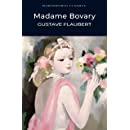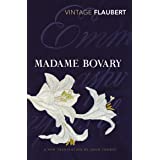I recently saw, enjoyed and reviewed a quirky but powerful dramatisation of Madame Bovary at Jermyn Street Theatre. At one point one of the actors dropped out of role to tease the audience about not having read the novel anyway so it didn’t, he implied, matter what they did with it. Well of course I’ve read one of the most famous of all French novels (although not, sadly, in the original language – if only) but not for many years. So I’ve now put that right.
The first thing which struck me – as nearly always with 19th century literature which didn’t stem from Victorian Britain – is how explicit Gustave Flaubert’s 1857 novel is compared with, say, Little Dorrit or Barchester Towers which were published in the same year. This is the Emma Bovary meeting her lover Leon for one of their regular trysts in a hotel, for example: “There was a great big mahogany bed in the shape of a boat. The curtains, made of red oriental stuff, hung from the ceiling, curving out rather too low over the wide bed-head – and there was nothing in the world as lovely as her dark hair and her white skin set against that crimson colour, when in a gesture of modesty, she closed her bare arms, hiding her face in her hands.” Even the simplicity of “She yielded” when she finally gives in to her earlier lover, Rudolphe, is sharply arresting.
 Emma Bovary – a pretty woman who reads romantic novels and has extravagant dreams – marries a not very competent and not over-bright country doctor, Charles Bovary, which she sees as an exciting escape and a step up from her own humdrum rural childhood. Bovary, generally a decent man, adores her but she quickly comes to view him, and everything he stands for as dull. “He [Charles] had his cap pulled down to his eyebrows, and his thick lips were trembling, adding a touch of stupidity to his face: even his back, his tranquil back was irritating to behold, and in the very look of his coat she found all the banality of the man.”
Emma Bovary – a pretty woman who reads romantic novels and has extravagant dreams – marries a not very competent and not over-bright country doctor, Charles Bovary, which she sees as an exciting escape and a step up from her own humdrum rural childhood. Bovary, generally a decent man, adores her but she quickly comes to view him, and everything he stands for as dull. “He [Charles] had his cap pulled down to his eyebrows, and his thick lips were trembling, adding a touch of stupidity to his face: even his back, his tranquil back was irritating to behold, and in the very look of his coat she found all the banality of the man.”
So she does two things – she spends money they don’t have and, despite having had a child with Bovary, she takes secret lovers with whom she enjoys rampant passionate sex. It’s effectively a sex and shopping novel. There is, of course, no happy ending for anyone. Flaubert’s last few pages are blunt, matter-of-fact and painful. But of course they’re also truthful. It is pretty much what would/could probably happen in real life. There is none of the jokey satire that we associate with Dickens of Trollope.
What Flaubert is doing is to consider the role, feelings and predicament of a real woman with needs (cf Ibsen’s A Doll’s House, 1879) and that’s as topical in 2023 as it was 166 years ago when Emma Bovary first made her presence felt. And look at the contrast with. for instance, Coventry Patmore’s poem The Angel in the House published three years earlier in Britain which is a saccharine paeon of praise to female domesticity.
Emma is not content to potter about in the country, supervising her husband’s meals, bearing children and socialising with the local pharmacists apparently idyllically happy family. She and Charles, reasonable as he usually is, never understand each other and what ensues is a tragedy for both of them. But even in 19th century France society cannot accept her individualism so she cannot, possibly, be allowed any sort of upbeat resolution. Anyway Rudolphe and Leon are both, in their different ways, using and exploiting her for their own ends. She would never have been happy with either of them in the long term any more than she is with Charles. In many ways she is the naïve victim of her own rose-coloured inexperience and expectations.
There was an obscenity trial in January 1857 following the serialisation of Madame Bovary the previous year. Flaubert and his book were acquitted but of courses, just as with Lady Chatterley’s Lover in London a century later, the publicity did wonders for sales. When it was published in book form that spring it became a best seller.
 Next week on Susan’s Bookshelves: The Observer’s Book of Music by Freda Dinn.
Next week on Susan’s Bookshelves: The Observer’s Book of Music by Freda Dinn.